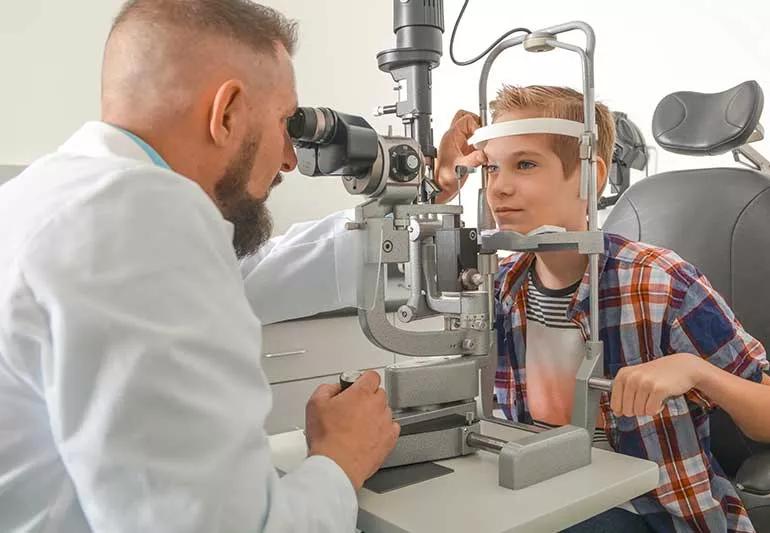Plan on an annual vision screening, but a full exam may not be necessary

Image content: This image is available to view online.
View image online (https://assets.clevelandclinic.org/transform/27d9cd4a-d642-4443-87ac-b06c3bafa81f/Back-to-School-Eye-Exam-900517046-770x533-1_jpg)
kid getting an eye exam
As your child prepares to start another school year, don’t forget to take care of one of their most important learning tools — their eyes.
Advertisement
Cleveland Clinic is a non-profit academic medical center. Advertising on our site helps support our mission. We do not endorse non-Cleveland Clinic products or services. Policy
Regular vision screenings and exams are critical for children as they advance through school, says pediatric ophthalmologist Allison Babiuch, MD. Research consistently shows a strong connection between vision and academic performance.
“When it comes to your child’s eyes, being proactive is important,” says Dr. Babiuch.
So, let’s take a closer look at the issue.
About 80% of learning involves your eyes, whether it’s through reading, writing or watching a video screen. Given that, an uncorrected vision problem can be a significant health barrier to learning (HBL).
Eye issues such as myopia (nearsightedness) or eye strain can make it more difficult for young students to follow along and understand classroom lessons, notes Dr. Babiuch.
Children with undetected vision disorders who struggle in class can even be misdiagnosed with learning disabilities or attention-deficit/hyperactivity disorder (ADHD), according to the American Optometric Association.
Children should have their vision screened annually, says Dr. Babiuch. A screening is a fairly brief assessment that can indicate a potential vision issue. It can be done by a pediatrician, family doctor or nurse at regular well-check visits.
Advertisement
Screenings could include a:
If a screening detects a potential issue, a more thorough eye exam should be scheduled with an ophthalmologist or optometrist. Most children don’t need an annual eye exam vs. a screening. (More on that in a moment.)
The answer to this question depends upon where you live in the United States. A review of state vision screening programs for school-aged children found that 41 states offer some type of assessment.
But researchers found that the method and frequency of those screenings vary widely. Only six states, for instance, require a vision screening annually or every other year. Screenings are most common in elementary school.
Will kids tell you if they’re having trouble seeing? They could … but how often do young children really share information like that? Or even recognize vision issues enough to know there may be a problem?
That’s why Dr. Babiuch recommends asking your child questions and watching for behavioral changes that may signal vision trouble. For example:
Academic troubles also may point toward vision issues. “Pay particular attention to their reading development,” says Dr. Babiuch.
An annual comprehensive eye exam isn’t always necessary for children, says Dr. Babiuch. However, plan on regular visits for your child to see an ophthalmologist or optometrist if:
In addition, you’ll want to schedule an appointment if your child develops crossed or wandering eyes. Ditto for drooping of their eyelid. “These may indicate other eye problems that can affect vision development, so you’ll want an exam,” emphasizes Dr. Babiuch.
Advertisement
And, as mentioned previously, try to get your child in to see an eye doctor if they fail a vision screen.
Advertisement

Sign up for our Health Essentials emails for expert guidance on nutrition, fitness, sleep, skin care and more.
Learn more about our editorial process.
Advertisement
Caring for eyes at an early age
Your eye prescription reveals a lot about your eye health, including how they’re shaped, how well you see and what your new glasses can do for your sight
Our vision and eye experts have the clear answer
Weighing benefits against age-related macular degeneration risk
Your eyes can reveal many clues about underlying health issues
And six warning signs for when they're not
Type 2 diabetes isn’t inevitable with these dietary changes
Applying a hot or cold compress can help with pain
Pump up your iron intake with foods like tuna, tofu and turkey